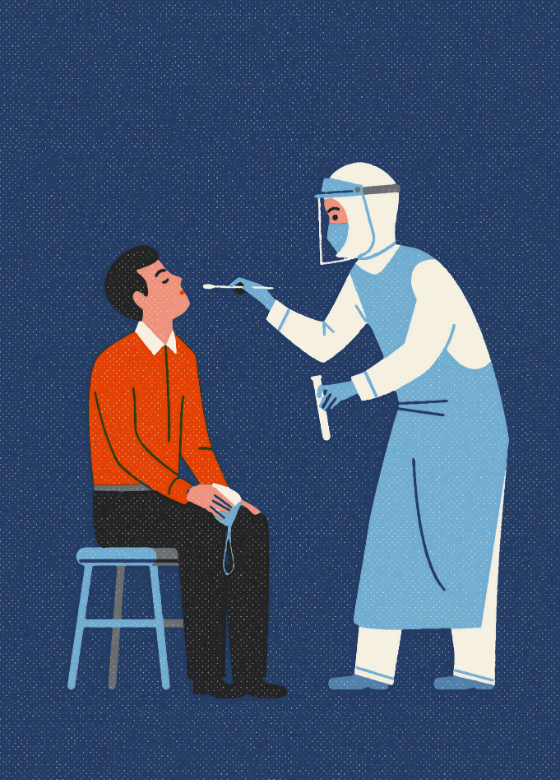World Health Day 2021: Facing hard truths to build a fairer, healthier world
Posted on
April 7, 2021
By: Katy Indvik
SALURBAL Project
As COVID-19 emerged and spread rapidly around the world in early 2020, some rushed to label the pandemic a “great equalizer.” More than a year later, each day brings new reminders that the impacts of the virus are anything but equal. Pre-existing socioeconomic and health inequities have resulted in enormous disparities in case counts and deaths- and, increasingly, in vaccine access and coverage. These disparities can be most apparent across our states, countries, and regions, seen clearly in the tracking apps that have become a feature of our daily lives, but they also exist within our own communities.
Analyzing the magnitude and drivers of these disparities will take time, and issues with data quality and availability will likely make capturing their full extent impossible. Yet we already know enough to be certain that our pandemic preparedness and response have been no equalizer.
 We know that some of us were and continue to be more exposed to the virus, because of the jobs we do, the neighborhoods we live in, and the way we move around our cities. We know that some of us were already more susceptible to the virus, because of the air we breathe and the water we drink, our access to healthcare and to active transport and safe places to play – and we know that all these factors are influenced by structural inequality, oppression, and racism.
We know that some of us were and continue to be more exposed to the virus, because of the jobs we do, the neighborhoods we live in, and the way we move around our cities. We know that some of us were already more susceptible to the virus, because of the air we breathe and the water we drink, our access to healthcare and to active transport and safe places to play – and we know that all these factors are influenced by structural inequality, oppression, and racism.
We know that not every city, state, or country responded in the same way to the pandemic, and that some responses were more effective and more equitable. Access to testing, tracing, treatment, and vaccines all depend on public health infrastructure, which is mostly likely to be lacking in disadvantaged neighborhoods. In turn, the short- and long-term economic and health impacts of lockdowns and other restrictions -such as unemployment, income loss, missed school, lost opportunities for physical activity, delayed access to preventive healthcare, and impacts on mental health- are not the same for everyone.
And we know that while some people in some places feel a growing wave of relief as they and their loved ones are vaccinated, many others are still straining to keep sight of a light at the end of a very long tunnel. While all adults in the United States will become eligible to receive the vaccine on April 19, Brazil, for example, is facing its most devastating months of the pandemic, with more than 71,000 deaths recorded in the past month, and only 2.4% of the population fully vaccinated to-date.
As evidence mounts of these difficult truths, we also know that our public health systems -and the systems that these depend on- must do better and become stronger. While recovering and building back from the pandemic presents opportunities, we also risk allowing the inequities in our communities, countries, and the world to grow even more extreme.

Leveraging the spotlight on Public Health
Understanding the social and physical characteristics of the urban environment that contribute to health inequities is critical to achieving a healthy, equitable, and sustainable recovery. One encouraging byproduct of the pandemic has been an apparent increase in interest in public health work and public health degrees. We need to leverage the urgency, the despair, and the triumphs of this year to drive critical research and action in public health across the globe.
This year’s International Conference on Urban Health, “Transforming our Collective Urban Future: Learning from COVID-19” will bring together an international network of interdisciplinary urban health researchers, policymakers, practitioners, and community advocates to exchange ideas, advance research, and drive action across sectors, transforming urban environments to promote health and environmental sustainability as we rethink urban health in the context of COVID-19.
The virtual format presents challenges, but also an opportunity to include a larger and more diverse group in this conversation. The three-day conference, hosted by the SALURBAL project, will explore six core themes:
- Urban Health Inequities: Urban health inequities have been both illuminated and exacerbated throughout the COVID-19 pandemic. These inequities disproportionately impact vulnerable populations including migrants, ethnic and racial minorities, poor people, and people living in informal settlements, often with limited access to basic services, and those lacking food, labor and/or social protections. The need to address the social determinants of health, including structural inequities and systemic racism in cities, has never been more urgent or apparent. Effective responses must incorporate community participation, intersectoral action, and inclusive governance.
- Transforming Built Environments: Urban environments can have profound effects on human health. The built environments of cities interact with complex social conditions and can promote sustainability and health or aggravate illness and disease. Features of built environments differ markedly between and within cities depending on history, cultural context, scale, land use and more. Policies and programs have the power to transform the built environments of cities and neighborhoods to enhance health, improve heath equity, and promote environmental sustainability.

- Urban Governance and Public Health Systems: Governments hold ultimate responsibility for guaranteeing those conditions in which people are able to be as healthy as they can be. Governance for urban health requires political leadership that recognizes the relevance of decisions made in sectors beyond health and healthcare in determining health. Governments also have responsibility for creating and sustaining essential public health systems and infrastructure. Failures to support and expand capacity in the public health system can make it more difficult to advance health in all policies and respond effectively to health emergencies. The authority assigned to city and local governments varies by country, but it is increasingly apparent that the public sector must interact effectively with a growing number of governmental and non-governmental actors to fulfill these responsibilities.
- Urban Health Over the Lifecourse: The urban setting creates both opportunities for and risks to health across the life course of people living in cities. Many health promotion programs have traditionally been structured around specific life stages, including initiatives targeted at childhood, adolescence, reproductive age, and older adults. However, many of these programs do not specifically address or target the role of the urban environment, and urban development experts and planners are often unaware of the potential health impacts of their interventions.
- Climate Change and Urban Health: Climate change is a major driver of urban health. Cities are especially susceptible to the adverse impacts of warming, sea-level rise, and increasingly frequent and severe extreme events. These impacts are inequitably distributed, and they are disproportionately experienced by vulnerable urban populations. Cities, in turn, play an important role in driving climate change. Urban areas contribute significantly to energy use, greenhouse gas emissions, and resource consumption – and present unique opportunities to mitigate environmental impacts, adapt to change, and promote health.

- Urban Health in Latin America and the Caribbean: Latin America and the Caribbean (LAC) is among the most urbanized regions of the world. Over 80% of the region’s population lives in urban areas that are heterogenous in their size, form, and social environments. For decades, the region has led innovative programs, policies, initiatives, and interventions that promote urban health and health equity. Lessons about the drivers of health in LAC cities and the most effective strategies for promoting urban health in the region have relevance for cities across the world.
The call for conference submissions and registration is still open. Please see more information on the ICUH2021 website and consider joining the urban health community for this critical conversation.